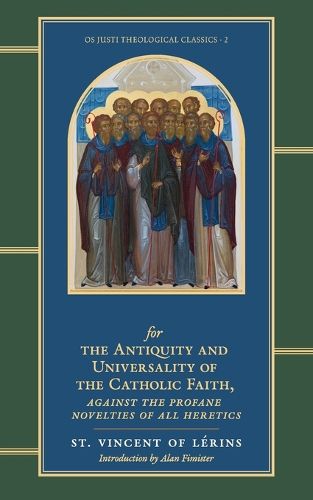Readings Newsletter
Become a Readings Member to make your shopping experience even easier.
Sign in or sign up for free!
You’re not far away from qualifying for FREE standard shipping within Australia
You’ve qualified for FREE standard shipping within Australia
The cart is loading…






This title is printed to order. This book may have been self-published. If so, we cannot guarantee the quality of the content. In the main most books will have gone through the editing process however some may not. We therefore suggest that you be aware of this before ordering this book. If in doubt check either the author or publisher’s details as we are unable to accept any returns unless they are faulty. Please contact us if you have any questions.
Although the Commonitorium is among the most famous and influential of fifth-century Latin Patristic works, relatively little is known about its author, Vincent ("the pilgrim," as he calls himself), a late-vocation monk of Lerins Abbey on the Isle of Saint Honorat off the coast of France. Yet the voice that speaks to us from these pages is rich in personality, deftly trained in logic, rhetoric, theology, and history. His thesis is clear, his argument compelling: the Christian faith is rooted in a changeless deposit of faith revealed by God, entrusted to the Apostles and their successors, and, accordingly, incompatible with novelty; progress consists only of a deeper understanding and expression of what remains in itself the same, so that no future formulation can ever contradict what has already been understood and expressed.
Across the centuries, Vincent's Canon-"In the Catholic Church, every care should be taken to hold fast to what has been believed everywhere, always, and by all"-has resounded as a battle cry for defenders of dogmatic tradition; indeed, it served as inspiration and catalyst for John Henry Newman's Essay on the Development of Christian Doctrine.Yet Vincent has also been pressed into service by the Eastern Orthodox, who maintain that his vision is precisely their own; and within the Catholic Church itself, both Pope Francis and his severest critics have cited the Commonitorium in support of their opposing views. Finally, liberal critics reject the validity of Vincent's Canon, asserting there is almost nothing that meets this criterion.
Os Justi Press's edition of the Commonitorium provides the reader with excellent tools for grasping the subtleties of Vincent's argument and for adjudicating the aforementioned interpretations. The original Latin text is given alongside the English translation. Peter Kwasniewski's preface furnishes context, Alan Fimister's theological introduction analyzes the ecclesial and magisterial structure of the Canon, and Phillip Campbell's epilogue defends the concept of the "unanimous consent of the fathers."
$9.00 standard shipping within Australia
FREE standard shipping within Australia for orders over $100.00
Express & International shipping calculated at checkout
This title is printed to order. This book may have been self-published. If so, we cannot guarantee the quality of the content. In the main most books will have gone through the editing process however some may not. We therefore suggest that you be aware of this before ordering this book. If in doubt check either the author or publisher’s details as we are unable to accept any returns unless they are faulty. Please contact us if you have any questions.
Although the Commonitorium is among the most famous and influential of fifth-century Latin Patristic works, relatively little is known about its author, Vincent ("the pilgrim," as he calls himself), a late-vocation monk of Lerins Abbey on the Isle of Saint Honorat off the coast of France. Yet the voice that speaks to us from these pages is rich in personality, deftly trained in logic, rhetoric, theology, and history. His thesis is clear, his argument compelling: the Christian faith is rooted in a changeless deposit of faith revealed by God, entrusted to the Apostles and their successors, and, accordingly, incompatible with novelty; progress consists only of a deeper understanding and expression of what remains in itself the same, so that no future formulation can ever contradict what has already been understood and expressed.
Across the centuries, Vincent's Canon-"In the Catholic Church, every care should be taken to hold fast to what has been believed everywhere, always, and by all"-has resounded as a battle cry for defenders of dogmatic tradition; indeed, it served as inspiration and catalyst for John Henry Newman's Essay on the Development of Christian Doctrine.Yet Vincent has also been pressed into service by the Eastern Orthodox, who maintain that his vision is precisely their own; and within the Catholic Church itself, both Pope Francis and his severest critics have cited the Commonitorium in support of their opposing views. Finally, liberal critics reject the validity of Vincent's Canon, asserting there is almost nothing that meets this criterion.
Os Justi Press's edition of the Commonitorium provides the reader with excellent tools for grasping the subtleties of Vincent's argument and for adjudicating the aforementioned interpretations. The original Latin text is given alongside the English translation. Peter Kwasniewski's preface furnishes context, Alan Fimister's theological introduction analyzes the ecclesial and magisterial structure of the Canon, and Phillip Campbell's epilogue defends the concept of the "unanimous consent of the fathers."